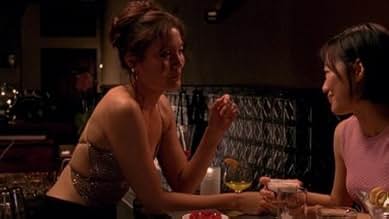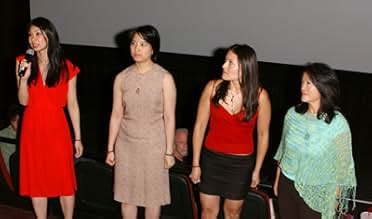NOTE IMDb
6,4/10
1,2 k
MA NOTE
Ajouter une intrigue dans votre langueThe Wongs struggle to cope with life, love, and family dysfunction in the suburbs of New York.The Wongs struggle to cope with life, love, and family dysfunction in the suburbs of New York.The Wongs struggle to cope with life, love, and family dysfunction in the suburbs of New York.
- Réalisation
- Scénario
- Casting principal
- Récompenses
- 5 victoires au total
Avis à la une
I really appreciated the slow, deliberate, and organic way this movie unfolds. The film is nearly plot less in the best way possible; it is a movie about people simply existing within their world, and writer/director Georgia Lee wisely eschews the temptation to up the ante or artificially increase the dramatic conflict beyond what is absolutely necessary. There are no villains here, just people trying to exist and navigate their way through their relationships with one another.
Everyone in this film -- from the three sisters (Jacqueline Kim, Elaine Kao, and Kathy Shao-Lin Lee) to the depressed father (Tzi Ma) to even the high school prankster (Sebastian Stan) and the overbearing mother (Freda Foh Shen) -- are fully fleshed out characters who transcend their respective "types" (aloof father, overbearing mother, responsible older sister, etc.) Only Sam Wong's distracted fiancé (Jayce Bartok) comes close to caricature, but his quiet interactions with Sam are always believable and never forced. The script is delicately and subtly written, and Lee manages to find a gentle humor in even the more potentially dark situations.
It's nice to see such a quiet and subtly realized movie today, when even smaller character dramas have a tendency to resort to melodrama or artificially "quirky" characters to make their impact. This film definitely feels like Ang Lee at his "Ice Storm" and "Brokeback Mountain" best, but it has a lightness of touch that Lee himself hasn't had since "The Wedding Banquet" over a decade ago.
This is both a film and a filmmaker that deserve to be discovered.
Everyone in this film -- from the three sisters (Jacqueline Kim, Elaine Kao, and Kathy Shao-Lin Lee) to the depressed father (Tzi Ma) to even the high school prankster (Sebastian Stan) and the overbearing mother (Freda Foh Shen) -- are fully fleshed out characters who transcend their respective "types" (aloof father, overbearing mother, responsible older sister, etc.) Only Sam Wong's distracted fiancé (Jayce Bartok) comes close to caricature, but his quiet interactions with Sam are always believable and never forced. The script is delicately and subtly written, and Lee manages to find a gentle humor in even the more potentially dark situations.
It's nice to see such a quiet and subtly realized movie today, when even smaller character dramas have a tendency to resort to melodrama or artificially "quirky" characters to make their impact. This film definitely feels like Ang Lee at his "Ice Storm" and "Brokeback Mountain" best, but it has a lightness of touch that Lee himself hasn't had since "The Wedding Banquet" over a decade ago.
This is both a film and a filmmaker that deserve to be discovered.
An excellent examination of life from several unique points of view that have not been given this type of treatment before. One can tell if a film is relevant when everyone who sees it takes aways something different from what was apparent to them on the screen whether it be humorous or dramatic. The appreciation of this film will only be tempered by your own experiences. Watch this film more than once and watch the layers unfold. Nothing on the screen is superfluous. One of the most satisfying films I've seen this year.
One of my favorite scenes was when the white guy/boyfriend (which would be me in the same situation)is invited to dinner and the younger sister puts something in his bowl that startles him. The moment is very brief. I thought it was hysterical, from my point of view. However, my wife who is Chinese didn't even notice the moment until we discussed the movie later in the evening. She could only notice the decor, which she though was funnier. Both scenes had the same level of truth. This is why the film is a remarkable achievement.
One of my favorite scenes was when the white guy/boyfriend (which would be me in the same situation)is invited to dinner and the younger sister puts something in his bowl that startles him. The moment is very brief. I thought it was hysterical, from my point of view. However, my wife who is Chinese didn't even notice the moment until we discussed the movie later in the evening. She could only notice the decor, which she though was funnier. Both scenes had the same level of truth. This is why the film is a remarkable achievement.
"Red Doors" starts out looking like a re-tread of early Ang Lee movies, but quickly adds a charmingly unique cross-generational element as three sisters and their father are at crossroads in their lives from retirement to career and romantic choices to literally explosive teen rebellion.
Each of the Chinese-American daughters has a relationship with a Caucasian, but inter-ethnic issues are less of a concern than human issues of self-realization, as the characters end up drawing strength from their cultural context as they deal with the pressures of being "the model minority."
While the writing is stronger than the directing as there's some drag, particularly during the middle daughter's seemingly endless and petty travails, writer/director Georgia Lee makes the best use of actual home movies - her family's -- since "Capturing the Friedmans," for bringing memories to life. We are actually seeing her sister's, lively co-star Kathy Shao-Lin Lee's, childhood as the family members take turns digitizing home movies.
As is usual in first timer's ethnic coming-of-age movies there's a bit of a stereotyped emphasis on art vs. commerce career choices and high school memories that are doubtless a filmmaker's autobiographical resonances. But each character is very much an individual, including having their own musical themes, from hip hop to mopey singer-songwriter tunes. The teen ager is an original spark plug of comic relief even as the family members' relationships aren't all resolved sit com style.
I particularly liked how the acculturated oldest sister pushes the depressed dad (a marvelous Tzi Ma) to see a shrink but he wisely finds a more traditional healing process that's the opposite of talk therapy and a touching contrast to the similar emotional crisis in "About Schmidt."
The title was explained in an off-hand remark at the end, a reference to the tradition of painting one's front doors red to bring good luck, and not all the audience caught the meaning, though we all appreciated the red doors pins that were distributed after the screening at the Tribeca Film Festival. It was also nice of the director to give up some of her allotment of tickets to people on the long line hoping to get in, which included many Chinese-American women from around the New York metropolitan area who had heard about the film through word of mouth.
The potential audience may be confused by the time this film is generally released with "Saving Face" that is being distributed earlier, as they share a few plot points, including parental conflict and a lesbian daughter, but on its own it is a lovely, sweet film.
Each of the Chinese-American daughters has a relationship with a Caucasian, but inter-ethnic issues are less of a concern than human issues of self-realization, as the characters end up drawing strength from their cultural context as they deal with the pressures of being "the model minority."
While the writing is stronger than the directing as there's some drag, particularly during the middle daughter's seemingly endless and petty travails, writer/director Georgia Lee makes the best use of actual home movies - her family's -- since "Capturing the Friedmans," for bringing memories to life. We are actually seeing her sister's, lively co-star Kathy Shao-Lin Lee's, childhood as the family members take turns digitizing home movies.
As is usual in first timer's ethnic coming-of-age movies there's a bit of a stereotyped emphasis on art vs. commerce career choices and high school memories that are doubtless a filmmaker's autobiographical resonances. But each character is very much an individual, including having their own musical themes, from hip hop to mopey singer-songwriter tunes. The teen ager is an original spark plug of comic relief even as the family members' relationships aren't all resolved sit com style.
I particularly liked how the acculturated oldest sister pushes the depressed dad (a marvelous Tzi Ma) to see a shrink but he wisely finds a more traditional healing process that's the opposite of talk therapy and a touching contrast to the similar emotional crisis in "About Schmidt."
The title was explained in an off-hand remark at the end, a reference to the tradition of painting one's front doors red to bring good luck, and not all the audience caught the meaning, though we all appreciated the red doors pins that were distributed after the screening at the Tribeca Film Festival. It was also nice of the director to give up some of her allotment of tickets to people on the long line hoping to get in, which included many Chinese-American women from around the New York metropolitan area who had heard about the film through word of mouth.
The potential audience may be confused by the time this film is generally released with "Saving Face" that is being distributed earlier, as they share a few plot points, including parental conflict and a lesbian daughter, but on its own it is a lovely, sweet film.
After viewing this, I was surprised to see on the DVD box that it had won some glowing blurbs and prizes at various festivals.
The script was OK, the situations potentially involving. But the unfocused, often amateurish, performances and occasional jarring attempts at comedy repeatedly broke the reality and brought to mind that old maxim, "There are no bad actors, only bad directors." The performances were mainly incoherent, unnatural. Director Georgia Lee seemed unable to help her actors communicate any steady undercurrent of withheld feelings, in a story that was largely about such. Key characters, mostly men, passed across the screen as unknowable entities.
I watched Red Doors convinced that most of the leads were capable of much better work, even though I'd only seen one, Tzi Ma, in anything else. Glowingly beautiful Mia Riverton, playing an actress, was hammy and false, killing any chemistry in her romantic scenes.
Secondary characters were worse. As the oldest Wong sister, Sam, Jacqueline Kim had the largest part and gave the most coherent, recognizably human performance. But the acting of the men playing her love interests was awful. Her old crush, a whispery-voiced high-school music teacher--an intended dreamboat--was wretchedly portrayed by a kid with suspiciously plucked eyebrows who looked about half her age and didn't sing well.
Extra points off for being set in and around New York City, ostensibly, yet establishing no NYC ambiance or locales.
So directing movies, it turns out, is like conducting a symphony, or performing rap, or brain surgery--it only takes one bad practitioner to prove that skill makes a difference.
The script was OK, the situations potentially involving. But the unfocused, often amateurish, performances and occasional jarring attempts at comedy repeatedly broke the reality and brought to mind that old maxim, "There are no bad actors, only bad directors." The performances were mainly incoherent, unnatural. Director Georgia Lee seemed unable to help her actors communicate any steady undercurrent of withheld feelings, in a story that was largely about such. Key characters, mostly men, passed across the screen as unknowable entities.
I watched Red Doors convinced that most of the leads were capable of much better work, even though I'd only seen one, Tzi Ma, in anything else. Glowingly beautiful Mia Riverton, playing an actress, was hammy and false, killing any chemistry in her romantic scenes.
Secondary characters were worse. As the oldest Wong sister, Sam, Jacqueline Kim had the largest part and gave the most coherent, recognizably human performance. But the acting of the men playing her love interests was awful. Her old crush, a whispery-voiced high-school music teacher--an intended dreamboat--was wretchedly portrayed by a kid with suspiciously plucked eyebrows who looked about half her age and didn't sing well.
Extra points off for being set in and around New York City, ostensibly, yet establishing no NYC ambiance or locales.
So directing movies, it turns out, is like conducting a symphony, or performing rap, or brain surgery--it only takes one bad practitioner to prove that skill makes a difference.
This movie is great and has a lot of heart. It focuses on one Asian American family, and of course, each family member has a distinct personality and set of issues. Red Doors is able to touch on these different characters and themes in a substantial and meaningful way. You walk away from the film feeling moved and that it did justice to all the characters and issues they dealt with. Additionally, this movie represents several groups that often do not receive much attention or coverage in Hollywood. For instance, minority groups, specifically Asian Americans are not a prevalent group in film today. Lesbians also do not have many positive representations of them on screen. This movie, however, is able to address both of these groups as well as other issues in a deep and moving way. Everyone should see this movie!
Le saviez-vous
- AnecdotesThe film was shot in twenty-three days, ten of which were at the director's parents' house in Waterford, Connecticut. Other locations included the Chuang Yen Monastery in Carmel, New York, Dwight-Englewood School in New Jersey, Lawrence and Memorial Hospital in New London, Connecticut, and various apartments and bars around Manhattan.
- Citations
Julie Wong: I'm so sorry.
Mia Scarlett: It's fine.
Julie Wong: You know what I'll get you a new one.
Mia Scarlett: It's fine, it's fine, it's fine.
[as she leans in for a kiss]
- Crédits fousThe family dog, Lucky, is listed in the cast credits as playing himself.
Meilleurs choix
Connectez-vous pour évaluer et suivre la liste de favoris afin de recevoir des recommandations personnalisées
- How long is Red Doors?Alimenté par Alexa
Détails
Box-office
- Montant brut aux États-Unis et au Canada
- 97 848 $US
- Week-end de sortie aux États-Unis et au Canada
- 35 050 $US
- 10 sept. 2006
- Montant brut mondial
- 97 848 $US
- Durée1 heure 30 minutes
- Couleur
Contribuer à cette page
Suggérer une modification ou ajouter du contenu manquant



































